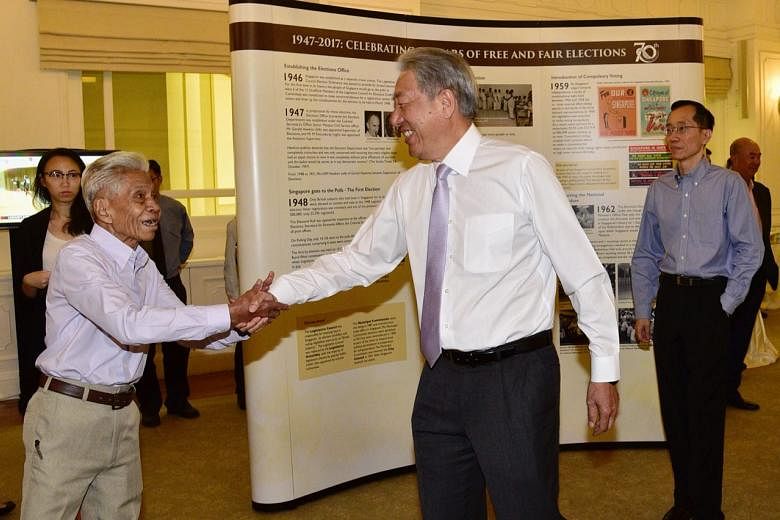SINGAPORE - Singapore's only national referendum was a gruelling 36-hour affair that left some election officers in tears.
Polling on the terms on which Singapore would enter the Federation of Malaya started at 8am on Sept 1, 1962, and a few hundred officers started the count after 8pm.
Early next morning, just before the results were announced, came a demand from Barisan Sosialis founder Lee Siew Choh for a recount.
This lasted till 11am, with election officials battling fatigue and hunger, said Mr Puteh Mahamood, who has worked at the Elections Department (ELD) since it was formed 70 years ago.
"It was one of our toughest polls. Those days we didn't have enough people. We worked for 36 hours straight, some of us without food, counting and counting all those slips," said the 84-year-old.
"Some of us counted till we cried."
Mr Puteh - who started at the ELD as a peon, or low-ranking worker, and now helps in such areas as operations and logistics - has worked behind the scenes in 69 elections and met political pioneers such as Mr David Marshall and Mr Lim Yew Hock.
He received a special mention in Deputy Prime Minister Teo Chee Hean's speech at the ELD's 70th anniversary celebration on Friday (Dec 29).
Mr Puteh exemplifies the dedication and commitment of ELD staff, said Mr Teo, as he lauded the department and its officers for their efforts in ensuring a fair, reliable and trusted election system.
As custodian of the election process in Singapore, ELD has contributed to 70 years of free and fair elections, and upheld the integrity of the democratic process, he added.
"The processes and procedures ELD has put in place for all the elections in Singapore have not been called into question, and this reflects the strong trust of candidates, political parties, voters and Singaporeans in ELD's work," Mr Teo said at the celebration in Fullerton Hotel, which was a government building that housed the department's first office.
Since it was set up in 1947 under the Colonial Secretary's Office, the ELD has conducted 69 elections.
Among them was the historic first legislative council election in 1948, which saw just 14,000 voters as only British subjects could contest and vote, and the dramatic national referendum on merger with the Federation of Malaya in 1963, "a milestone that shaped the history of Singapore".
Of these, 48 elections - from by-elections to presidential elections - were conducted after Singapore gained independence in 1965, noted Mr Teo.
At the last general election in 2015, more than 2.3 million voters cast their votes to elect 89 members of parliament, Mr Teo noted. It was the first election since independence where all constituencies were contested.
ELD, which has 28 regular staff, does not conduct elections alone, he added.
It trains public servants for an election, which it organises with various ministries and statutory board.
The returning officer leads 35,000 election officials from across the public service to help conduct elections smoothly and efficiently and in accordance with Singapore laws - "truly an example of One Public Service working together", said DPM Teo, who is also Minister-in-charge of the Civil Service.
In the seven decades, ELD has refreshed the election process in a bid to ensure convenience and keep up with the times.
In 1954, automatic voter registration took the place of voluntary registrations - and five years later, voting was made compulsory.
"Singaporeans take their civic responsibility to vote seriously, with voter turnout at presidential and general elections above 94 per cent on average," noted Mr Teo.
As more Singaporeans head overseas for work or studies, ELD has worked with the Ministry of Foreign Affairs to provide for overseas voting, implementing it in selected cities for the first time in the 2006 general election.
There are now 10 overseas polling stations in major global cities, including London and Tokyo.
Since the 2011 presidential election, candidates and counting agents were provided with sample counts to give an early indication of the possible outcome and "prevent speculation and misinformation from unofficial sources", said Mr Teo.
These were released to the public for the first time in the 2015 general election.
ELD has also striven to make things more convenient for voters, he noted, with many polling stations at nearby locations, such as community centres and void decks. It is also getting ready for an ageing population by ensuring barrier-free access to all polling stations, he added.
Wheelchairs are available for those who need them. ELD will also expand and enhance its e-services and website for voters and candidates, and implement e-registration at polling stations to slash waiting times.
Mr Puteh said: "I'm happy I had the chance to be a part of so many historic events, but I'm even happier now to see everything in our election process improved and so convenient."
He added with a wry smile: "Hopefully, no one cries again."
Exhibits and videos on ELD's milestones can be viewed at its 70th anniversary webpage at http://www.eld.gov.sg/70th_anniversary.html



